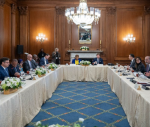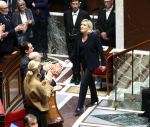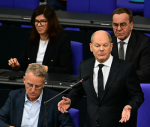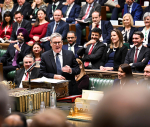You are here
Trump’s self-deluding generals
Jan 31,2018 - Last updated at Jan 31,2018
When Donald Trump ceded his authority over military operations to commanders on the ground and, even, pilots in the air over Afghanistan, Syria and Iraq, he boosted the number of US bombing runs and bombs dropped on Taliban and Daesh targets and killed more civilians than under the more cautious Obama administration. Paul McLeary, writing in Foreign Policy on September 18, 2017, revealed the number of bombs dropped on Afghanistan was higher than any other period since August 2012 and said US warplanes “are hitting more targets in Iraq and Syria than at any point in the three year campaign” against Daesh.
McLeary stated the number of bombs dropped in Afghanistan during the first eight months of Trump’s regime were 2,400, far more than the 1,338 dropped during all of 2016. An additional 3,000 ground troops were due to be deployed to accompany Afghan troops during operations and will be charged with calling air and artillery strikes. In August when the third year of US bombing in Iraq and Syria began, the US dropped 5,075 bombs. During the first eight months of 2017, 32,800 bombs are said to have hit Daesh targets, more than the 30,743 dropped during 2016.
On January 26 Truthdig columnist Sonali Kolhatkar updated the results of Trump’s decision to give a free hand to the US military by saying there has been “an almost 50 per cent increase of air strikes in Iraq and Syria during Trump’s first year in office, leading to a rise in civilian deaths by more than 200 per cent compared with the year before”. She quoted the British monitoring group Airwars which said: “This unprecedented death toll coincided with the start of the Trump presidency, and suggested in part that policies aimed at protecting civilians had been scaled back under the new administration.”
These harsh facts make it clear that Trump, who has no military or political experience, and his administration care little about innocent civilians caught up in the conflicts gripping these three countries. Trump relies on advice from his closest aides who are military men wedded to the use of force to resolve both military and political problems.
Chief-of-staff John Kelly, a retired marine general; Defence Secretary James Mattis, another ex-marine general; and national security adviser H.R. McMaster, a serving army general, have all fought in Afghanistan and Iraq. Trump also counts for advice on armed forces chief Joseph Dunford, a marine general who served in the two US wars on Iraq and in Afghanistan.
Trump has appointed Kelly, Mattis and McMaster to senior civilian positions and ceded his authority as commander-in-chief to officers-on-the-ground because he has long admired the military although he opted out of the draft for the Vietnam war by claiming disability.
On one hand, the generals have departed from former President Barack Obama’s cautious policy by committing additional troops and stepping up operations in Iraq, Syria and Afghanistan. On the other hand, they have tried to manage the irrational, impulsive Trump with the objective of preventing him from taking rash actions.
Trump’s generals, all of whom served under Obama, have criticised him for pulling US forces out of Iraq before Al Qaeda — the parent of Daesh and Jabhat Al Nusra — had been eliminated and argued more US troops were essential in the campaign against Daesh. Mattis, in particular, has been sharply critical of the deal over Iran’s nuclear programme negotiated by Obama and did not feel his administration took the threat of Iran’s involvement in Iraq, Syria and, allegedly, in Yemen. The generals are self-deluded. While they blame Iran for the rise of “terrorism” in the region, the groups branded as “terrorist” are Sunni takfiris not Shiites allied to Iran.
The three generals in Trump’s Cabinet are also deluding themselves by putting the blame on Obama for the rise of Al Qaeda and Iranian influnce in the region. All three took part in the wars waged by Obama’s predecessor George W. Bush as well as the 1991 war on Iraq mounted by his father George H.W. Bush who steadfastly refused to consider any option other than war for getting Iraqi forces out of Kuwait. Jordan’s late King Hussein did his utmost to avoid that conflict — which led to the Bush Junior war on Iraq in 2003.
Bush Junior should have confined his campaign to Afghanistan, targeting the Taliban leadership and Al Qaeda and its founder Osama Bin Laden to retaliate for the September 11, 2001, attacks on New York and Washington. Instead, prodded by pro-Israel neo-conservatives, Bush Junior launched his regime-change war on false pretexts against Iraq.
Once the secular government had gone, he installed a pro-Iranian Shiite fundamentalist regime. It was Bush who handed Iraq over to Iran. The security vacuum left by that war allowed Al Qaeda — still operating freely in Afghanistan — to establish itself in Iraq. The sectarian Iraqi regime discriminated against and abused Sunnis who joined Al Qaeda to fight Baghdad and Washington.
Obama can be at least partly blamed for the prolongation of the war in Syria. In August 2011, he said Syria’s President Bashar Assad, who had clamped down heavily on unrest, should step down. Obama then supported Turkey’s surrogate Free Syrian Army and expatriate opposition Syrian National Council in their failed bid to oust Assad. Obama said nothing when Turkey funnelled foreign takfiri fighters into Syria.
Obama did nothing when Al Qaeda in Iraq morphed into Nusra and Daesh and crossed into Syria. Once established there, Daesh swept across the border into Iraq and seized Fallujah, Ramadi and Tikrit. He reacted only after Daesh captured Mosul and threatened Baghdad. Iran has dispatched militiamen and Revolutionary Guard officers and soldiers to contain and eliminate Daesh and Nusra in both Iraq and Syria. In this effort Iran has operated as a partner with the US which refuses to recognise this hard fact and is forever hostile.
Therefore, Trump’s generals have to admit that, while taking part in the wars in Afghanistan and Iraq, they helped create the problems this region continues to face on a daily basis. They must try to convince Trump bombing civilians cannot resolve these problems; only sensible political action can.













